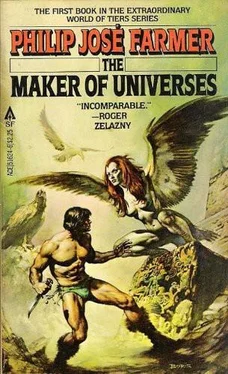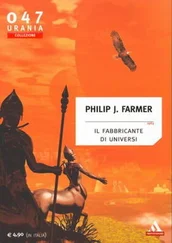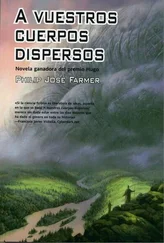Afterward, he did not exactly remember what they said to each other, for he was in a fever of exaltation, succeeded by a chill of frustration and despair, then followed by another fever. He felt as if he could talk forever, and he reached his hand out to touch hers. She strained against the opening in the rock in vain to reach him. “Never mind, Chryseis,” he said. “You know we’re here. We’re not going to leave until we take you away, I swear it.”
“Ask her where the horn is!” Kickaha said.
Hearing him, Chryseis said, “I do not know, but I think that von Elgers has it.”
“Has he bothered you?” Wolff asked savagely.
“Not so far, but I do not know how long it will be before he takes me to bed,” she replied. “He’s restrained himself only because he does not want to lower the price he’ll get for me. He says he’s never seen a woman like me.”
Wolff swore, then laughed. It was like her to talk thus frankly, for in the Garden world self-admiration was an accepted attitude.
“Cut out the unnecessary chatter,” Kickaha said. “There’ll be time for that if we get her out.”
Chryseis answered Wolff’s questions as concisely and clearly as possible. She described the route to this room. She did not know how many guards were stationed outside her door or on the way up.
“I do know one thing that the baron does not,” she said. “He thinks that Abiru is taking me to von Kranzelkracht. I know better. Abiru means to ascend the Doozvillnava to Atlantis. There he will sell me to the Rhadamanthus.”
“He won’t sell you to anybody, because I’m going to kill him,” Wolff said. “I have to go now, Chryseis, but I’ll be back as soon as possible. And I won’t be coming this way. Until then, I love you.”
Chryseis cried, “I have not heard a man tell me that for a thousand years! Oh, Robert Wolff, I love you! But I am afraid! I…”
“You don’t have to be afraid of anything,” he said. “Not while I am alive, and I don’t intend to die.”
He gave the word for Kickaha to drag him back onto the rooftop of the bartizan. He rose and almost fell over from dizziness, for his head was gorged with blood.
“The Yidshe has already started down,” Kickaha said. “I sent him to find out if we can get back the way we came and also to see what’s causing the uproar.”
“Us?”
“I don’t think so. The first thing they’d do, they’d check on Chryseis. Which they haven’t done.”
The descent was even slower and more dangerous than the climb up, but they made it without mishap. Funem Laksfalk was waiting for them by the window which had given them access to the outside.
“They’ve found the guard you killed,” he said. “But they don’t think we had anything to do with it. The gworl broke loose from the dungeon and killed a number of men. They also seized their own weapons. Some got outside but not all.”
The three left the room and merged quickly with the searchers. They had no chance to go up the flight of steps at the end of which was the room where Chryseis was imprisoned. Without a doubt, von Elgers would have made sure that the guards were increased.
They wandered around the castle for several hours, acquainting themselves with its layout. They noted that, though the shock of the gworl’s escape had sobered the Teutons somewhat, they were still very drunk. Wolff suggested that they go to their room, and talk about possible plans. Perhaps they could think of something reasonably workable.
Their room was on the fifth story and by a window at an angle below the window of Chryseis’ bartizan. To get to it, they had to pass many men and women, all stinking of beer and wine, reeling, babbling away, and accomplishing very little. Their room could not have been entered and searched, for only they and the chief warder had the keys. He had been too busy elsewhere to get to their room. Besides, how could the gworl enter through a locked door?
The moment Wolff stepped into his room, he knew that they had somehow entered. The musty rottenfruit stench hit him in the nostrils. He pulled the other two inside and swiftly shut and locked the door behind them. Then he turned with his dagger in his hand. Kickaha also, his nostrils dilating and his eyes stabbing, had his blade out. Only funem Laksfalk was unaware that anything was wrong except for an unpleasant odor.
Wolff whispered to him; the Yidshe walked toward the wall to get their swords, then stopped. The racks were empty.
Silently and slowly, Wolff went into the other room. Kickaha, behind him, held a torch. The flame flickered and cast humped shadows that made Wolff start. He had been sure that they were the gworl.
The light advanced; the shadows fled or changed into harmless shapes.
“They’re here,” Wolff said softly. “Or they’ve just left. But where could they go?”
Kickaha pointed at the high drapes that were drawn over the window. Wolff strode up to them and began thrusting through the red-purple velvet cloth. His blade met only air and the stone of the wall. Kickaha pulled the drapes back to reveal what the dagger had told him. There were no gworl.
“They came in through the window,” the Yidshe said. “But why?”
Wolff lifted his eyes at the moment, and he swore. He stepped back to warn his friends, but they were already looking upward. There, hanging upside down by their knees from the heavy iron drapery rod were two gworl. Both had long, bloody knives in their hands. One, in addition, clutched the silver horn.
The two creatures stiffened their legs the second they realized they were discovered. Both managed to flip over and come down heads-up. The one to the right kicked out with his feet. Wolff rolled and then was up, but Kickaha had missed with his knife and the gworl had not. It slid from his palm through a short distance into Kickaha’s arm.
The other threw his knife at funem Laksfalk. It struck the Yidshe in the solar plexus with a force that made him bend over and stagger back. A few seconds later, he straightened up to reveal why the knife had failed to enter his flesh. Through the tear in his shirt gleamed the steel of light chain-mail.
By then, the gworl with the horn had gone through the window. The others could not rush to the window because the gworl left behind was putting up a savage battle. He knocked down Wolff again, but with his fist this time. He threw himself like a whirlwind at Kickaha, his fists flailing, and drove him back. The Yidshe, his knife in hand, jumped at him and thrust for his belly, only to have his wrist seized and turned until he cried out with the pain and the knife fell from his fist.
Kickaha, lying on the floor, raised one leg and then drove the heel of his foot against the gworl’s ankle. He fell, although he did not hit the floor because Wolff seized him. Around and around, their arms locked around each other, they circled. Each was trying to break the other’s back and also trying to trip the other. Wolff succeeded in throwing him over. They toppled against the wall with the gworl receiving the most damage when the back of his head struck the wall.
For a flicker of an eyelid, he was stunned. This gave Wolff enough time to pull the stinking, hairy, bumpy creature hard against him and pull with all his strength against the gworl’s spine. Too heavily muscled and too heavily boned, the gworl resisted the spine-snapping. By then, the other two men were upon him with their knives. They thrust several times and would have continued to try for a fatal spot in the tough cartilage-roughened hide had Wolff not told them to stop.
Stepping back, he released the gworl, who fell bleeding and glaze-eyed to the floor. Wolff ignored him for a moment to look out the window after the gworl who had escaped with the horn. A party of horsemen, holding torches, was thundering over the drawbridge and out into the country. The light showed only the smooth black waters of the moat; there was no gworl climbing down the wall. Wolff turned back to the gworl who had remained behind.
Читать дальше












